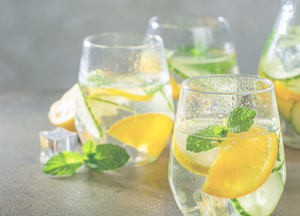January always feels like a fresh start, and now that we’re halfway through the month, it’s a great time to check in with yourself. After the indulgent holiday season, many of us are looking for ways to reset and that often means cutting back on alcohol. If you’re one of us attempting Dry January, experimenting with moderation, or simply trying to break old habits, this time of year can be both refreshing and challenging.
Finding a healthier balance with alcohol can feel like a big shift. The good news? You don’t have to do it alone. With the right mindset and a few simple strategies, navigating life without alcohol — even temporarily — can feel a little easier. We’ve put together a guide to help you survive the rest of Dry January or anytime you feel the need to cut back and drink more mindfully.
What is Dry January?

Dry January is a personal challenge to alcohol for the entire month of January. It’s a chance to reset or revisit your relationship with alcohol, explore healthier habits, and give your body a break after the indulgences of the holiday season. It’s also a perfect entry point for those who are sober curious, offering a structured way to experiment with life without alcohol. Participating in Dry January can help you gain insight into your drinking patterns and discover the benefits of sobriety.
How Did Dry January Start?
Dry January began in 2013 as a campaign by Alcohol Change UK, a charity aimed at reducing alcohol-related harm. The goal was to raise awareness about the impact of alcohol on physical and mental health while encouraging people to take a mindful pause from drinking. Since then millions have participated annually and the movement has grown into a global phenomenon, inspiring people to reset their habits and embrace a healthier lifestyle, even beyond January.
Is Dry January Popular?
Dry January has taken off in a big way around the globe. Thanks to social media buzz, backing from health organizations, and a growing lineup and improvement in the quality of non-alcoholic drinks, it’s easier (and trendier) than ever to give it a try. Surveys show more people jumping on board each year, signaling a cultural shift toward more mindful drinking habits. You’ve likely heard friends talk about it and may even see bars and restaurants offering nonalcoholic options in January (or in general) to support the sober and sober-curious.
Is Dry January Good For You?
Yes, for many people Dry January is worth trying and has many health benefits like:

-
Improved liver function
-
Better sleep and mood
-
Increased energy levels
-
Weight loss or weight stabilization
-
Clearer skin
-
Lower blood pressure
-
Decreased cholesterol levels
-
Reduced risk of alcohol-related cancers
-
Improved immune system function
-
Enhanced mental health by reducing anxiety or depression
Even a short break from alcohol can improve sleep, boost energy, and enhance mental clarity. Participants often report feeling more focused and productive. Beyond health benefits, it’s also an excellent way to build self-awareness and develop a healthier relationship with alcohol.
Can Dry January Be Bad For You?
For most people, Dry January is a healthy, low-risk challenge. However, if you have an alcohol dependency, quitting cold turkey can lead to serious withdrawal symptoms like tremors, seizures, or worse. If you’re nervous about how your body will respond to quitting alcohol, don’t go it alone. Talk to a healthcare professional first to find a safe way to cut back with the right support.
What is Damp January?
Damp January is a more flexible alternative to Dry January. Instead of complete abstinence, participants focus on reducing their alcohol intake. This approach allows for moderation, such as limiting drinks to weekends or special occasions, or just giving yourself a limit or cutoff time for enjoying alcohol. Damp January is a great option for those who find full sobriety challenging but still want to reassess their habits.
Why Is Dry January So Hard?
Dry January can be challenging because drinking is often tied to socializing or even family gatherings. It’s part of celebrations, relaxation, or stress relief — it’s woven into our habits and social lives. Breaking away from these patterns can feel tough, especially when physiological cravings or emotional connections to alcohol come into play.
The first few days of Dry January are often the hardest as your body and mind adjust to the change. The cravings or emotional pull toward alcohol can feel especially strong during this initial period, but it’s a sign your body is adjusting to new habits. Fortunately, wiith some preparation and support, it gets easier. In fact, in 2024, 25% of adults successfully completed Dry January — a number that's grown each year.
What to Drink During Dry January
The popularity of Dry January is making finding alternatives to alcohol easier (and more enjoyable!) than ever. Here are some ideas:

- Sparkling water with fruit or herbs
- Mocktails or non-alcoholic beers and wine
- Herbal teas and kombucha
- Functional beverages like mushroom coffee or adaptogenic blends
- Coffee
- CBD infused drinks
It’s helpful to have a variety of options on hand to act as replacements for alcohol depending on the occasion or when cravings hit.
How to Survive Dry January: 8 Tips to Stay On Track
Participating in Dry January can be as simple or structured as you like. Here are 10 tips to help you successfully navigate the month:
1. Set your intention
Identify why you’re doing Dry January. Think about the reason you’re sober curious — the health benefits, saving money, or mental clarity. Knowing your motivation will keep you grounded and give you something to focus on when you’re feeling tempted by alcohol.
2. Build a support system
Share your goals with family and friends and ask someone to be your accountability buddy. If you don’t have someone to support you, consider joining an online community like Club Soda, Soberistas, or a Dry January Facebook Group for encouragement.
3. Stay hydrated and stock healthy snacks

Keep a water bottle handy, adding lemon, mint, or cucumber for flavor, and sip during meals or cravings. Stock up on healthy snacks like nuts, fruits, and yogurt — high-protein, whole foods can help curb cravings and keep you energized.
4. Explore alcohol-free drinks
Staying sober doesn’t mean boring tap water. Stocking up on alcohol-free drinks like those listed above will give you something new and exciting to look forward to. You may even find you prefer a cup of functional mushroom coffee or CBD-infused seltzer over your go-to cocktails.
5. Stay active
Put your energy toward new activities like walking, yoga, or gym sessions. Physical activity will boost your mood and energy levels giving you more willpower to abstain from alcohol. Even keeping your hands busy with cooking, art, or playing music can help keep your mind off your regular drinks.
6. Track your progress
Reflecting on small wins, like clearer focus or better sleep, can create a sense of accomplishment that keeps you moving forward. Keep a journal to jot down your thoughts, challenges, and successes as a personal reminder of how far you’ve come, or try a wellness app like Reframe, Try Dry, or Habitica to log daily achievements.
7. Celebrate small wins weekly
Look back and celebrate your wins in a journal. Notice the benefits of going alcohol-free like better sleep, improved relationships, a better mood, or more energy. Reward yourself for hitting weekly goals with non-alcohol-related treats. Consider spending the money saved on drinks to splurge on something for yourself.
8. Avoid triggers and have a backup plan

Identify situations or people that might tempt you to drink, and plan how to handle them in advance. If you typically drink in the evening, plan a fun new evening routine. If you’re more of a social drinker, know how to answer the inevitable question of “Why aren't you drinking?” or consider planning alcohol-free events so you can still socialize without feeling the pressure or alcohol.
By embracing Dry January with preparation and a positive mindset, you can enjoy a healthier start to the year and gain valuable insights into your habits. Remember to focus on the benefits you see and view any challenges as opportunities for growth.
Cheers to a Healthier You
Dry January isn’t just about saying no to alcohol for 31 days — it’s about saying yes to better sleep, more energy, and a clearer mind. Think of it as a gift you’re giving yourself: a chance to hit the reset button and see what’s possible when you step outside your comfort zone and consider mindful drinking or simply staying sober. Whether you’re in it for the health benefits, the savings, or just a fresh start, you’re setting the stage for a better you.


